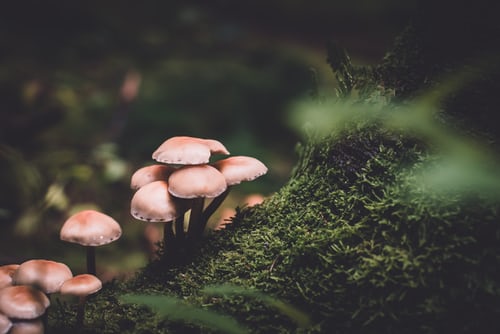Don’t be afraid of the term ‘medicinal mushrooms’, as when it’s referred to within naturopathic medicine, we are speaking of the safe, controlled, and effective mushrooms, well evidenced by research, for their benefits in human health. There are a variety of well known mushrooms used for treating an array of chronic illness and disease, to imparting significance in terms of optimizing health. Yet when it specifically comes to cancer, mushrooms shine as medicinal superstars.
Turkeytail
Otherwise known as Coriolus versicolor, turkeytail is one of the most researched medicinal mushrooms as far as its benefits in health and disease are concerned. It is recognized for its powerful adaptogenic, anticancer, antioxidant, anti-inflammatory, and immune enhancing properties. This herb has been shown in many studies to help prevent and aid in recovery and survival in a variety of commonly diagnosed cancers. Most significantly, turkeytail is safely used alongside chemotherapy and radiation to help mitigate side effects and improve overall resiliency and patient energy. This mushroom, by far, is one of the most common go to’s when it comes to its powerful influence on cancer.
Chaga
Known also as Inonotus obliquus, Chaga musrhoom is very commonly found growing from birch trees. Similar to many other medicinal mushrooms, chaga is a rich source of beta-glucans, a substance well known for their ability to modulate the immune system and create anti cancer effects. Chaga has been shown to slow the growth of lung, breast and cervical cancer cells, and is often successfully used for its betulinic acid in cases of melanoma. In addition to its anti cancer ability, it is extremely anti inflammatory, is a potent antioxidant, lowers blood sugar, is highly nutritious, and greatly supports adrenal health.
Reishi
Known in Chinese medicine as Ganoderma lucidum or “the mushroom of immortality”, Reishi continually demonstrates its cytotoxic effects on cancer. Several studies demonstrate that extracts of Reishi down-regulate VEGF and MAPK signalling, as well as induce cell cycle arrest, apoptosis, and autophagy (all potent cancer growth signals and pathways). Interestingly, patients who take Reishi often experience improved responses to chemotherapy and radiation. In addition to the plethora of anti cancer effects of Reishi, it significantly helps enhance the immune system, reduces stress, and improves sleep. Also, as far as this mushroom goes, if you’re experiencing any sense of fatigue, exhaustion, or energy issues, Reishi mushroom is often the mushroom for you.
Lion’s Mane
Also known as Hericium erinaceous, Lion’s Mane is named for its physical similarity to that of the mane of a lion. A significant part of research has been focused on the neuroprotective properties of this mushroom, however specific to cancer, is its influence on the digestive organs (including stomach, liver, intestine and colon). Its extracts, given orally, have demonstrated tumour suppressing activity similar to that of 5-fluoruracil, a widely used drug clinically applied for the treatment of gastrointestinal cancers, yet with a much lower general toxicity. Similar to other all other mushrooms mentioned above, Lion’s Mane possess significant immune modulating and anti stress benefits, creating massive immune support and adaptogenic (anti stress) qualities. If memory, mental clarity or brain health is of concern, Lion’s Mane is often the mushroom of choice.
The potential and safety of medicinal mushrooms are vast. With a focus on integrative cancer care, using these mushrooms with patients come with little to no potential danger yet create significant anti disease and health promoting benefit.

